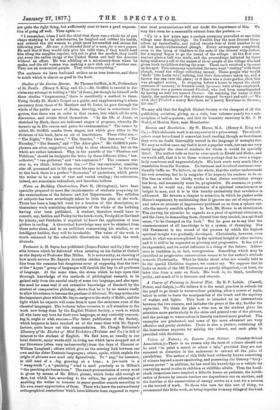Professor A. H. Sayce has published (James Parker and Co.)
the very able lecture which he delivered when entering on his duties at Oxford as the deputy of Professor Max Mallen It is noteworthy, as showing of bow much service Mr. Sayoe's Accaclian studies have proved in saving him from the common but dangerous error of supposing that the laws of the "Aryan " group of languages will furnish the key to all problems of language. At the same time, the stress which he lays upon that thorough knowledge of the methods of philological research to be gained only from the careful study of some one language, and also upon the need for some real if not extensive knowledge of Sanskrit by the student of comparative philology, shows that he is by no means ready to allow his science to become the pastime of dilettanti. We may notice also the important place which Mr. Sayce assigns to the study of Keltic, and the light which he expects will come from it upon the structure even of the classical languages. The lecturer takes occasion to call attention to the work now being done by the English Dialect Society, a work to which all who have any love for their own language, or any cariosity concern- ing it, ought to wish success.—The latest publication of the Society, which happens to have reached us at the same time with Mr. Sayee's lecture, quite bears out this commendation. Mr. Clough Robinson's Glossary of the Dialect of Mid-Yorkshire (Triibner and Co.) is full of interest to the student of English. We find here, as usually in our lotal dialects, many words still in living use which have dropped out of our literature (often very undeservedly) from the days of Chaucer or William Langland ; others which give us the missing link between our own and the sister Teutonic languages ; others, again, which explain the origin of phrases now used only figuratively. To" nag," for instance, is still used of a dog gnawing at a bone ; a jaw-tooth is a " wang-tooth "; a "parching "wind is used precisely as in Milton's "the parching air burns frore." The exact pronunciation of every word is given by means of Mr. Ellis's glossic, which looks Odd enough at first, but which has, according to the editor, the great advantage of enabling the writer to transfer to paper peculiar sounds according to his own exact appreciation, of them. Those who know the extraordinary orthographical contortionewhich have hitherto been supposed to repro-
sent local pronunciations will not doubt the importance of this. We may find room for a seasonable extract from the preface :—
"Up to a few years ago, a curious ceremony prevailed at one little village near Boroughbridge. On Twelfth Day the men dressed them- selves up fantastically, and yoked twenty-four of their number to an old but newly-whitewashed plough. Every arrangement completed, even to the tying of bladders to the ends of the drivers' whip-lashes, the company began to go the round of the village. At the first con- venient place a halt was made, and the proceedings initiated by there being read over a roll of the names of those people of the village who had given birth to children during the year. These each received a by-name on the spot. This ceremony concluded, the men went 'stetting' with their plough, round the village collecting money. Those people who would ' thole ' [the Latin tul-i] nothing, had their door-stones taken up, and a furrow was run over the place ; or if there was a front garden, then this was ploughed across. In stopping before a house to repeat the short sentence of' nomony,' or formula usual, by-names were always employed. Thus there was a person named Firelock, who had been complimented by having an only son named Stunner. On reaching the house of this family, the spokesman of the stotters stepped forward and said We wish Aud Firelock a merry Kers'mas, an' a merry Kers'mas to Stunner, his son 1"


































 Previous page
Previous page